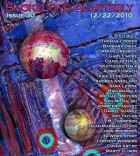Reading “What Do You Do?” offers a movie-like experience, the images of poverty and sorrow vivid on a big screen, and your relentless use of the word “you” keep the characters alive for a long time. Is the setting Cuba? These factors give this piece authenticity which in turn makes me curious about its genesis. Could you talk a little bit that?
First and foremost, thank you for your generous comments on the story. I am honored and delighted that it stayed with you!
Regarding its genesis, I originally heard about this incident when I was growing up in Havana. It happened in a neighborhood close to mine, though I didn’t know any of the people involved. I believe soon after, the Cuban government introduced a law to charge culprits with the death penalty if they killed someone during the act of stealing a bicycle. The robberies, which had become rampant, suddenly stopped. I’m not sure if this incident in particular had anything to do with the passing of the law, but it definitely took place around the same period.
A few months ago, while rummaging through my childhood memories, the story came to mind, and I thought it deserved to be told. I wanted to hear the mother’s voice, evoke her thoughts and feelings from her point of view. Then, as I sat to write it, the idea of doing it in second person seemed best. In my view, it draws the reader in even more, puts them in her shoes, especially since the actual incident occurred in Cuba, which brings me to the other part of your question.
I definitely intended to use elements from the actual country where it happened. Mentioning communism, the notion of leaving the country, Santería, the sporadic use of Spanish words, etc, were meant for the story to be specific. However, I didn’t think it was necessary to clearly state it was Cuba, allowing readers the possibility that it might have taken place anywhere.
Your story reflects a universal condition, though, now it’s sad these kinds of situations exist in so many places. What are your feelings about the responsibility of writers to create meaningful stories? What is your writing philosophy?
I’d like to answer this question in three parts. First in reference to fiction writers, then writers in general, and finally myself.
The main responsibility fiction writers have, in my view, is allowing their characters to speak. Oftentimes writers intrude on the story, not letting it take shape on its own. The characters we create are entities that deserve an individual voice, one that should come through and develop with our help, not our interference. Our intentions and expectations should always come second to the unpredictable journey that is writing a story. Otherwise we end up with a piece that shares an idea, opinion, experience, succession of events, etc, as narrowly interpreted or planned by a writer and not by the characters, the ones who are supposed to communicate with the reader. I understand there can be a thin line between a writer’s voice and that of their characters, and sometimes they may be the same, but I truly believe there’s always a distinction that must be respected and embraced. Once this is accomplished, then a fiction writer is able to move on to other responsibilities, such as capturing a situation, a place, a time, and making them universally relevant and therefore lasting.
In terms of all writers, I think their principal responsibility is to explore. Whether aspects of real life or imagination, the more writers explore, the more they are able to find those memorable and poignant moments that take writing from being a simple action to an experience. Though I want to say writers must be, above all, voices for the masses, keen-eyed observers, people who embrace the ambiguous, dark, and often ignored side of life (and they should be and do these things), without deep exploration, little can be accomplished.
Personally, and in addition to the aforementioned, my current responsibility is to keep growing as a writer. As someone who has yet to reach the age of thirty, I see myself as rather young and fairly inexperienced, despite my socially and economically difficult upbringing and the obstacles I’ve faced later in life. My constant improvement, I feel, is necessary in order to do my stories justice.
The responsibility to let characters speak and to allow the story to develop in an organic way is what you’re saying? Your comments seem to come from someone older than thirty so I sense you’ve found your passion. What kinds of exercises, practice, classes, and so forth do you recommend for writers? What advice can you give, say, someone just starting out?
Let me first say that I’m immensely flattered by your question. I’m not sure I’m in a position to give anyone advice, so I’ll just talk about what has worked for me and some of the opinions I currently hold, though I know all writers are different.
I think creative writing courses can definitely be beneficial to writers, especially those who are just starting out. If nothing else, it will give them a critical audience and the opportunity to read the work of others who are likely at a similar level. The exercises and discussion that take place in these classes will open lots of proverbial doors to multiple aspects of writing. I personally don’t favor any specific exercises, but I think anything from free writing to asking your character questions has the potential to yield something useful. Also, these courses will often expose inexperienced writers to professors who have a lot to teach. I’ve been fortunate to study under people like John Dufresne, Lynne Barrett, and Michael Hettich, who have done more for me as a writer and person than they’ll ever know.
The main advice I would give is simple: read and write, as much as you can. The best way to embrace literature is to read it, to think about it critically, and to appreciate the work of all writers, even those whom we don’t necessarily like. We can learn from what’s not working in a story as much as we can from what’s working. Also, writers should be aware of where they stand in relation to the literature world at large, and the best way to do this is to read avidly. Then sit your butt down, write, revise, and repeat. Being a writer is hard work, but if you find yourself making excuses not to do it, postponing it, waiting for a sporadic moment of inspiration, or claiming you have writer’s block, then maybe you are not ready to really tackle the craft.
Lastly, I’d say trust yourself. There’s a lot of insecurity and ego involved in writing, so just trust that your characters have something to say and that you want to acquire the proper tools to allow the characters to say it.
Helpful and inspirational advice, Dariel. I have one more question. Now that the SmokeLong audience has read your story and met you through this interview, when and where can we read more of your work?
Well, I’m working on a collection of stories set in Cuba, so hopefully a few of those pieces will soon find their way into journals and magazines. I am also hoping to enter an MFA program in the near future. Currently, I’m putting together a website, so if anyone wants to know about my work in the meantime, they can contact me on Facebook, http://www.facebook.com/dariel.suarez1. They can also read a couple of features I wrote for The Florida Book Review by visiting their website.



 The core workshop of SmokeLong Fitness is all in writing, so you can take part from anywhere at anytime. We are excited about creating a supportive, consistent and structured environment for flash writers to work on their craft in a community. We are thrilled and proud to say that our workshop participants have won, placed, or been listed in every major flash competition. Community works.
The core workshop of SmokeLong Fitness is all in writing, so you can take part from anywhere at anytime. We are excited about creating a supportive, consistent and structured environment for flash writers to work on their craft in a community. We are thrilled and proud to say that our workshop participants have won, placed, or been listed in every major flash competition. Community works.